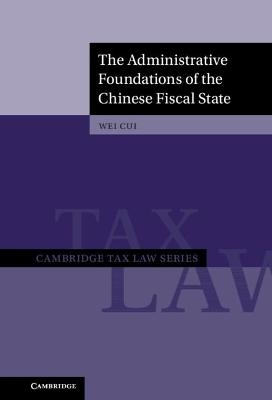
The Administrative Foundations of the Chinese Fiscal State
Seiten
2022
Cambridge University Press (Verlag)
978-1-108-49142-6 (ISBN)
Cambridge University Press (Verlag)
978-1-108-49142-6 (ISBN)
This systematic study of Chinese taxation explains the lessons China's successful revenue-raising effort holds for developing countries, the reasons why mainstream economic theories must be revised to recognize fundamentally different types of state capacity, and the challenging questions the Chinese paradigm raises for the future of taxation.
On subjects ranging from trade to democratization, there has lately been a wave of laments about China's development belying Western expectations. Yet these disappointments often come with misunderstandings of the very institutions that China was expected to adopt. Chinese taxation offers a sharp illustration. When China introduced a tax system suited for the market economy, it fully intended tax collection to rely on self-assessment, audits, and the rule of law. But this Western approach was quickly jettisoned in favour of one that emphasized monitoring of taxpayers and ex ante interventions, at the expense of deterrence and truthful reporting norms. The Chinese approach surprisingly matches recommendations made by recent economic scholarship on tax compliance and state capacity. China's massive but little-known explorations in taxation highlight the distinct types of modern state capacity, and raise challenging questions about the future of taxation and the superiority of institutions based on rule of law.
On subjects ranging from trade to democratization, there has lately been a wave of laments about China's development belying Western expectations. Yet these disappointments often come with misunderstandings of the very institutions that China was expected to adopt. Chinese taxation offers a sharp illustration. When China introduced a tax system suited for the market economy, it fully intended tax collection to rely on self-assessment, audits, and the rule of law. But this Western approach was quickly jettisoned in favour of one that emphasized monitoring of taxpayers and ex ante interventions, at the expense of deterrence and truthful reporting norms. The Chinese approach surprisingly matches recommendations made by recent economic scholarship on tax compliance and state capacity. China's massive but little-known explorations in taxation highlight the distinct types of modern state capacity, and raise challenging questions about the future of taxation and the superiority of institutions based on rule of law.
List of figures and tables; Acknowledgements; List of abbreviations; Introduction; 1. The forgotten reform; 2. What is an audit?; 3. Atomistic coercion; 4. Returning responsibilities to taxpayers; 5. Organizing revenue; 6. Policymaking without information; 7. The rhetoric of law; 8. Varieties of state capacity; 9. Pivoting away from the rule of law; References; Index.
| Erscheinungsdatum | 21.03.2022 |
|---|---|
| Reihe/Serie | Cambridge Tax Law Series |
| Zusatzinfo | Worked examples or Exercises |
| Verlagsort | Cambridge |
| Sprache | englisch |
| Maße | 158 x 235 mm |
| Gewicht | 570 g |
| Themenwelt | Recht / Steuern ► EU / Internationales Recht |
| Recht / Steuern ► Öffentliches Recht | |
| Recht / Steuern ► Steuern / Steuerrecht | |
| Sozialwissenschaften ► Politik / Verwaltung ► Staat / Verwaltung | |
| Wirtschaft ► Volkswirtschaftslehre ► Wirtschaftspolitik | |
| ISBN-10 | 1-108-49142-1 / 1108491421 |
| ISBN-13 | 978-1-108-49142-6 / 9781108491426 |
| Zustand | Neuware |
| Informationen gemäß Produktsicherheitsverordnung (GPSR) | |
| Haben Sie eine Frage zum Produkt? |
Mehr entdecken
aus dem Bereich
aus dem Bereich
Organisationen steuern, Strukturen schaffen, Prozesse gestalten
Buch | Softcover (2024)
Rehm Verlag
38,00 €
Problemorientierte Einführung in die Verwaltungswissenschaft
Buch | Softcover (2025)
Springer Fachmedien Wiesbaden GmbH (Verlag)
37,99 €


